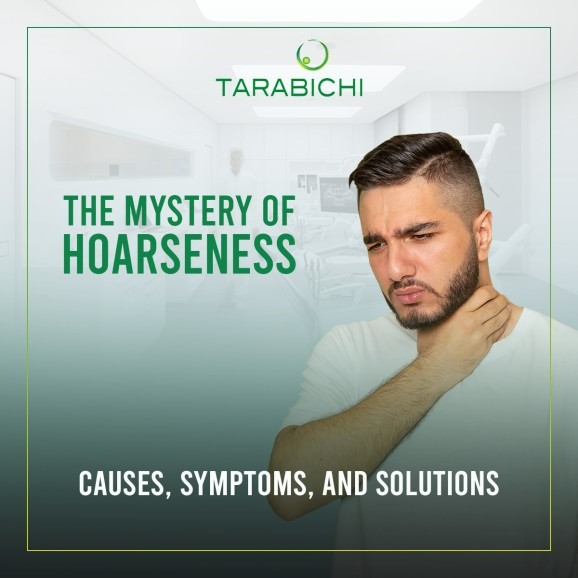The Mystery of Hoarseness: Causes, Symptoms, and Solutions
Contact Us
Hoarseness is a common condition that affects the voice, causing a change in its quality, and making it sound raspy, strained, or weak.
In this article, we will delve into the causes, symptoms, and potential treatments for hoarseness, helping you gain a better understanding of this vocal ailment, so whether you're a singer, public speaker, or simply curious about maintaining a healthy voice, we've got you covered.
What is hoarseness in medicine?
Hoarseness refers to a change in the voice that results in an abnormal sound characterized by roughness, raspiness, or a strained quality.
Hoarseness occurs when there is a disruption or alteration in the normal functioning of the vocal cords or the structures surrounding them.
The vocal cords, located in the larynx (voice box), play a crucial role in producing sound, They vibrate as air passes through, creating the vocal sounds we use for speaking and singing, and when the vocal cords are not functioning properly, the voice can become hoarse.
What is the cause of hoarseness?
Hoarseness can be caused by a variety of factors, including:
- Voice overuse or misuse (Straining the vocal cords by yelling, or excessively talking without proper vocal rest).
- Laryngitis is one of the most common causes of hoarseness.
- Vocal cord nodules, polyps, or cysts due to vocal abuse, chronic irritation, or vocal cord trauma.
- Gastroesophageal reflux disease (GERD) where stomach acid flows back into the throat, can cause long-term hoarseness.
- Paralyzed vocal cords can affect their movement and vibration, leading to hoarseness.
- Allergic reactions or excessive mucus production from conditions like allergies or sinusitis.
- Smoking or exposure to secondhand smoke, as well as inhaling irritants such as pollutants, chemicals, or certain fumes.
- Neurological conditions (such as Parkinson's disease or multiple sclerosis).
- Thyroid conditions (Disorders like hypothyroidism or hyperthyroidism).
- Aging (Elderly people are more susceptible to this disease).
- Patient career (Individuals who use their voices professionally, such as singers, actors, teachers, and public speakers).
Hoarseness diagnosis
Diagnosing the cause of hoarseness typically involves a medical history review and some additional tests, here are the common steps involved in diagnosing hoarseness:
- Physical examination (Laryngoscopy):
A thorough examination of your throat, neck, and vocal cords will be conducted, your healthcare provider may use a laryngoscope (a flexible tube with a camera) to visualize the vocal cords and assess their movement, appearance, and overall function.
- Voice evaluation:
You may be asked to perform various vocal tasks to assess the quality, pitch, and range of your voice.
- Additional tests:
Depending on the findings from the history and physical examination, your healthcare provider may recommend additional tests to further evaluate the cause of hoarseness, these tests may include:
- Stroboscopy (using a strobe light to observe the vibration and movement of the vocal cords in detail).
- Imaging tests may be ordered to assess the structures of the throat, neck, and vocal cords.
- A biopsy may be taken for laboratory analysis if there are suspicions of abnormal growth or cancer.
Also read:
- Banishing Cholesteatoma: Effective Strategies for Treatment.
- Eustachian Tubes: Anatomy, Dysfunction, Treatment.
When should I be worried about hoarseness?
While hoarseness is often a temporary condition, there are certain situations where it is advisable to seek medical attention and be more vigilant, here are some complications associated with hoarseness:
- Laryngitis: Laryngitis is an inflammation of the larynx, which is the voice box.
- Vocal cord nodules (small growths on the vocal cords) can make the voice sound hoarse and breathy, in some cases, they can also cause pain.
- Vocal cord polyps (small, non-cancerous growths on the vocal cords).
- Vocal fold paralysis (a condition in which one or both vocal cords do not vibrate properly and it can be caused by surgery, injury, or a neurological disorder).
- Laryngeal cancer: It is most common in men over the age of 50, it can cause hoarseness, difficulty breathing, and a lump in the neck.
How do you cure hoarseness?
The treatment of hoarseness depends on the underlying cause, here are some general approaches and self-care measures that can help alleviate hoarseness:
- Voice rest and Minimize activities that require prolonged or forceful voice use.
- Hydration: Drink plenty of fluids, preferably water, to keep the vocal cords lubricated and prevent dryness.
- Avoid excessive caffeine and alcohol consumption, as they can dehydrate the body and contribute to vocal cord dryness.
- Use a humidifier or vaporizer to add moisture to the air, particularly in dry environments.
- If you smoke, quitting is strongly advised to improve your vocal health.
- Reflux management and possibly medications prescribed by a healthcare professional can be helpful.
- Practice good vocal hygiene by speaking at a comfortable volume, using proper breath support, and avoiding vocal habits or techniques that strain the voice.
- In cases where hoarseness is caused by vocal cord nodules, polyps, cysts, or other structural abnormalities, surgical intervention or other medical treatments may be necessary.
After all, hoarseness is a serious condition that should be treated before it results in more virulent complications, furthermore, you can book an appointment with Tarabichi Clinics.
You can also view:
If you are looking for the Best ENT Clinic in Dubai or the Best ENT Doctors in Dubai, please reach out to us on the below details, our team comprises of only the best ent doctors in UAE and the region.




